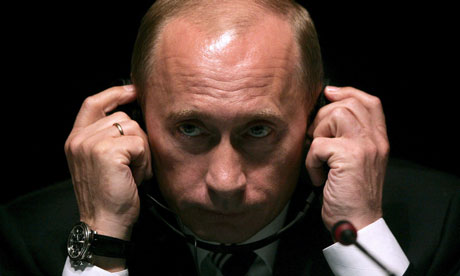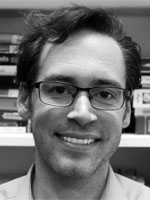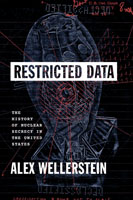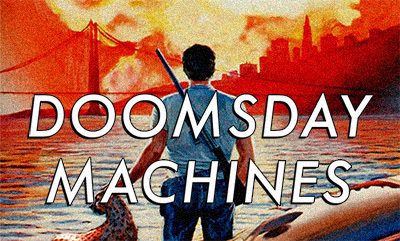Recently, Russian Prime Minister Vladimir Putin praised the work of US spies in helping the Soviet Union get the atomic bomb. Reuters quotes him:
You know, when the States already had nuclear weapons and the Soviet Union was only building them, we got a significant amount of information through Soviet foreign intelligence channels. … The were carrying the information away not on microfilm but literally in suitcases. Suitcases! … It was the cream the scientific world that was gathered in America, and I personally have gotten the impression that they consciously gave us information on the atom bomb. … They did this consciously because the atom bomb had been used on Hiroshima and Nagasaki and scientists from mankind’s intellectual elite at the time understood what unilateral possession of such a weapon might lead to.1
The sum total of context given is that he told this to “military commanders.” Not a whole lot to go on. Why’s Putin praising spies? I mean, it’s not a huge stretch for the former FSB chief, but a little more background would be nice.
The original story on ITAR-TASS (the state news agency) doesn’t tell too much more context, either, though it describes the immediate context as being about the need to maintain a strategic balance with the United States (not just praising spies for their own sake). Interestingly, there are two Putin quotes left out of the English-language versions, and they go some of the distance in contextualizing these remarks a bit more.
One involves the specific example of Niels Bohr who Putin claims helped them out in a small way:
Continuing an excursion into history, he reminded them of an episode, when Soviet scientists came across serious difficulties in calculations and sought assistance from Swedish [sic]nuclear scientist Niels Bohr, who worked for the Americans, and he helped them. “When our scientists could not calculate, they sent a young little known specialist to him in one of the international conferences. And he told him directly: ‘You know, we are counting and counting, but its now working out.’ He made the calculations, he helped,” said Putin.2
This is a rather well-known event — Bohr met with Yakov Terletsky in Copenhagen in November 1945. It was sexed-up by the Pavel Sudoplatov in his infamous 1994 KGB memoir Special Tasks, where he claimed that Bohr was “essential to starting the Soviet reactor.” Since then historians have not tired of pointing out the flaws in Sudoplatov’s account, using Beria’s files to show that Bohr gave the USSR no more information than was already published in the Smyth Report (which the Soviets had already pored over in some detail).
The other bit of note is the final paragraph of the ITAR-TASS story, where Putin says that he’s sure Igor Kurchatov (the scientific head of the Soviet program) would have developed an independent bomb anyway without US assistance:
At the same time Putin has no doubt that Soviet scientists lead by Igor Kurchatov would have been able to develop nuclear weapons on their own. “This work would have taken longer and the work would have cost more,” said the Premier.3
To my eyes, these two remarks say something quite different about Putin’s statements than one might get out of the English versions. The English versions make it seem like Putin is gloating over the major “moles,” as the Reuters headline puts it, by which us historians of course think of Klaus Fuchs, Ted Hall, David Greenglass, etc. The “suitcases” remark would seem to reflect that, though in truth none of those spies hauled out information in suitcases, though their diplomatic contacts probably did (these are probably the “Soviet foreign intelligence channels” that Putin references — colleagues like Sudoplatov).
But the only specific name he invokes is Bohr, a case where there was no material assistance given — though I imagine that Putin is more aware of Sudoplatov’s back-door account than he is of later historical scholarship. And we know from VENONA, the Soviet archives, and the confessions of those involves, that Fuchs, Hall, and Greenglass gave away far more important information than Bohr ever did. And they did not do it, as Putin suggests, after Hiroshima and Japan — all three started spying well before the bomb was used. Their motivations were somewhat mixed, though attributing them to the desire to restore a strategic balance, or at least to let the USSR “in” on the Allied work, is not the worst distillation of them.
Putin also goes out of his way to preserve the dignity of the Soviet scientists. This has been a major sticking point over the years, as Hugh Gusterson has discussed: the usage of espionage in the Soviet bomb program is undisputed, but whether the Soviet scientists knew about it, and whether they can “take credit” for making the bomb without being reliant on the United States, is a matter where national pride is as stake. Gusterson relates a case in which the Soviet scientists showed that they could not have used the Ivy Mike fallout to deduce its design, because they flushed it down the sink by accident: “Thus did the carelessness of a chemist save the honor of a nation.”4
All of this for me brings up a larger question of the thankless job of espionage. I coincidentally had a long conversation about this with Nancy Greenspan, who was at the AIP’s Niels Bohr Library and Archives last Thursday. She related how those who were close to Klaus Fuchs were unhappy that he had never received any medals or official acknowledgement by the USSR for his work, which by all accounts was about as much as one would ask for from a spy, and one which he suffered personally for.
The Rosenbergs got a plug by Nikita Khrushchev in his memoirs, but it’s hard to know what to make of something like that:
From Stalin and from the longtime Soviet Foreign Minister, Vyacheslav M. Molotov, the memoir says, Khrushchev learned that Julius and Ethel Rosenberg had “provided very significant help in accelerating the production of our atomic bomb.”
“Let this be a worthy tribute to the memory of those people,” the memoir says of the Rosenbergs. ”Let my words serve as an expression of gratitude to those who sacrificed their lives to a great cause of the Soviet state at a time when the U.S. was using its advantage over our state to blackmail our state and undermine its proletarian cause.”5
There’s a lot of evidence that Julius Rosenberg was a spy, but not so much Ethel. But the bigger issue here is that the spies that got thanked were the ones who fell down on the sword and became martyrs to the cause6 — the ones who either were never publicly exposed during the Cold War (Ted Hall) or confessed (Klaus Fuchs) received no such acknowledgment.
Technological espionage is a tricky thing, if you’re a domestic turncoat, as opposed to an imported, foreign agent. In the country you’re spying on, you’re a traitor. In the country you’re spying for, you’re an uncomfortable reminder of their reliance on foreign research. In either case, your loyalty’s dubious and your motivations are suspect.7
In the end, though, to turn back to the Putin statements, I think they say a lot less than the articles about them claim. Putin’s making a rather bland analogy about strategic parity, at a time when he’s doing a little saber-rattling for political purposes. (It was recently announced that for the first time since the Cold War, Russian ballistic missile submarines will be back on continuous, uninterrupted patrols. And of course, there’s the little matter of the Russian Presidential election taking place in a week.) He does so by invoking Sudoplatov-style stories of Western scientists defecting by the dozen (ignoring the ones who actually did spy), and carves out plenty of room to preserve Soviet honor. There’s less here about Soviet spies than there is about Putin.
- Steve Gutterman, “Putin Praises Cold War moles for stealing U.S. nuclear secrets,” Reuters (22 February 2012). [↩]
- Thanks to my buddy Kirill for helping with the translation. Original: Продолжая экскурс в историю, он напомнил эпизод, когда советские ученые столкнулись с серьезными трудностями в расчетах и обратились за помощью к шведскому ядерщику Нильсу Бору, который работал на американцев, и тот им помог. “Когда наши ученые не могли посчитать, направили к нему на одну из международных конференций молодого малоизвестного специалиста. Тот ему прямо сказал: “Вы знаете, мы считаем-считаем, у нас не получается”. Он взял и посчитал, помог”, – рассказал Путин. [↩]
- Original: При этом Путин не сомневается, что советским ученым во главе с Игорем Курчатовым было по плечу самостоятельно разработать атомное оружие. “Просто подольше бы продолжалась эта работа и подороже бы стоила”, – сказал премьер. [↩]
- Hugh Gusterson, “The Death of the Authors of Death: Prestige and Creativity Among Nuclear Weapons Scientists,” in Mario Biagioli and Peter Galison, eds., Scientific Authorship: Credit and Intellectual Property in Science (New York: Routledge, 2003), 281-307, on 289. [↩]
- Robert D. McFadden, “Khrushchev on Rosenbergs: Stoking Old Embers,” New York Times (25 September 1990. [↩]
- Of course, it’s hard to categorize the Rosenbergs. On the one hand, they insisted they were wholly innocent, and became a cause célèbre for the American Left for decades. So they didn’t exactly martyr themselves for Stalin, except in the sense that they didn’t name names. [↩]
- Kristie Macrackis talks about this in her book on the East German Stasi, Seduced by Secrets (which I reviewed) — it’s a common issue whenever one is spying against one’s “home” country for another country. [↩]




Sudoplatov’s original report on the Bohr-Terletsky conversation was printed in English in Cold War International History Project (CWIHP) Bulletin #4 “Soviet Nuclear History.” It is available online here: http://www.wilsoncenter.org/publication-series/cwihp-bulletin.
Free hard copies of CWIHP Bulletin #4 are available by writing to ColdWar@wilsoncenter.org.
Thanks, Tim! I find the Sudoplatov affair incredibly interesting.